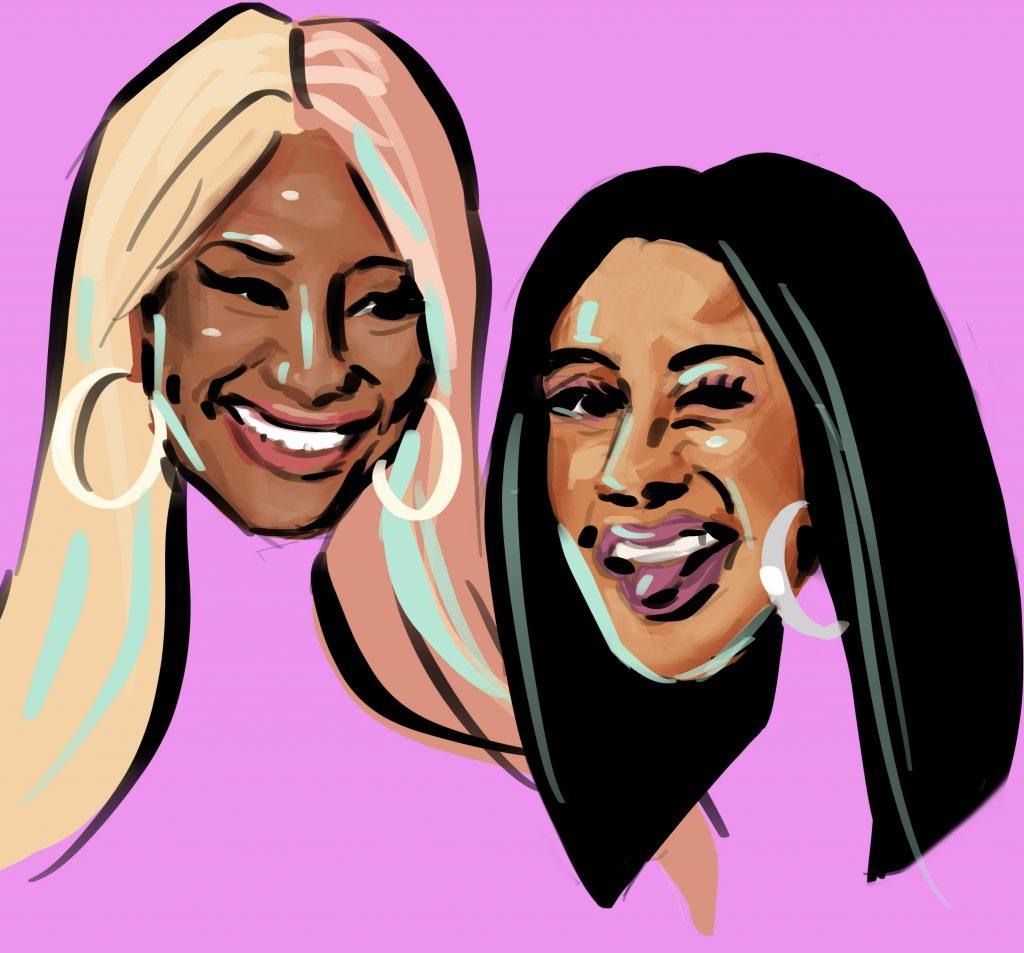Soaking wet and dancing ankle deep in a pool, Cardi B and Megan Thee Stallion are surrounded by backup dancers — each wearing a black leather two-piece set and fishnet stockings. The deep bass of their song “WAP” pounds in the background.
When the song was released on Aug. 7, the world stopped for a second. Raking up 93 million streams in its first week, Cardi B and Megan Thee Stallion captured sexuality, empowerment, confidence and opulence in three minutes and seven seconds. It’s safe to say the world was listening, but amid the love for an empowering anthem was a problem Black women in rap always face: blatant misogyny.
Backlash in the industry
The worldwide popularity of “WAP” shined a light on the way women who proudly present their sexuality are received poorly by the public. However, this is nothing new — double standards are prevalent within the entire music business and especially within the rap industry.
“A man can talk about how he’s about to do all of these drugs and then come and shoot your house up,” Megan Thee Stallion said in an interview with Marie Claire. “But as soon as I say something about my vagina, it’s the end of the world?”
Many listeners, including Palo Alto High School junior Jaelyn Mitchell, note that this inequality is evident beyond “WAP” and is endemic in the rap industry. Women receive a disproportionate amount of criticism than they deserve on the basis of their gender.
“It might not seem important, but it is because it normalizes female sexuality and allows for other girls to feel comfortable.”
— Marilyn Yin, junior
“Men demonize Black women constantly in their songs,” Mitchell said. “People hate on Black women all the time … that’s why as a Black woman you can’t seem aggressive at all because you don’t wanna be perceived that way. Any note of confidence or power is seen as aggression and anger to society.”
One hater of the song is James Bradley, a Republican running for the House of Representatives in California’s 33rd District. Bradley tweeted, “Cardi B & Megan Thee Stallion are what happens when children are raised without God and without a strong father figure. Their new ‘song’ The #WAP (which i heard accidentally) made me want to pour holy water in my ears and I feel sorry for future girls if this is their role model!”
https://twitter.com/BradleyCongress/status/1291735105774522368
Empowerment through music
Some women might find their sexuality to be something that they are ashamed of because negative depictions of female sexuality are common in mainstream media.
Being able to dance or sing along to a song uncensored in sexual content is empowering to women who feel constantly scrutinized by the standards set upon them by modern society.
Paly junior Marilyn Yin enjoys listening to female rappers because their songs give a voice to women, allowing them to celebrate their sexuality and break from the sense of shame cultural norms have imposed upon them.
“Any note of confidence or power is seen as aggression and anger to society.”
— Jaelyn Mitchell, junior
“It [music from female rappers] might not seem important, but it is because it normalizes female sexuality and allows for other girls to feel comfortable,” Yin said.
While Megan Thee Stallion, Cardi B and Nicki Minaj have become household names, women are still fighting to be heard and respected within rap, as well as in the broader music industry.
“You got all these guy rappers out here who ain’t really talking about a lot, but we all would commend them, as many as they come,” Megan Thee Stallion said in an interview with Billboard Magazine. “So I was really excited that a lot of women got their shine this year.”
Additional reporting by Audrey Kernick
RELATED STORIES
Khalid: The evolution of a young artist’s music
Attention Deficit Music: Senior duo produces new pop songs
Euphoria’s effects: Gen Z defined by drugs, tech and identity
Sex Education: Netflix comedy redefines teen sexuality
Tompert’s tunes: Bringing people together through music
Is this the sound of the end of the world?: Why “Miss Anthropocene” is a prophecy worth listening to
Romaine calm and play on: An unlikely group finds their rhythm





